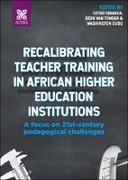Explore

Recalibrating teacher training in African higher education institutions
Martha Matashu, Melikhaya Skhephe, Byron J. Bunt, Deon van Tonder (editor), Esther Mavengano, Tobias Marevesa, Adri du Toit, Joyce Phikisile Dhlamini, Precious-Pearl V. Mlotshwa, Muchativugwa Liberty Hove, Sifiso Sibanda (editor), Kufakunesu Zano, Louise Olivier, Washington T. Dudu (editor), Kgomotsego Brenda Samuel, Motlhale Judicial Sebatana, Benedict Mofosi
2022
0 Ungluers have
Faved this Work
Login to Fave
This book critically examines the role of governments in promoting parity during and in post-pandemic education. This comes from the realisation that the pandemic has deepened the crisis by depleting the meagre resources that African countries might have devoted to ‘normative educational practices’ where those on the margins would have been pushed further behind while the privileged would have been further initiated into the cultural and capital flows of private schools and historically research-intensive institutions of higher learning. This has far-reaching implications for the education of underprivileged citizens, and education, particularly modes and modalities of delivery, has to be reimagined to subvert the challenges wrought by the pandemic. This book significantly bridges the gap between the pre-and post-COVID-19 pandemic pedagogical practices and the erstwhile modalities that have been resilient over time. The book focuses on ways to stave off pedagogical challenges that face countries as the global pandemic makes its mark.
This book is included in DOAB.
Why read this book? Have your say.
You must be logged in to comment.
Rights Information
Are you the author or publisher of this work? If so, you can claim it as yours by registering as an Unglue.it rights holder.Downloads
This work has been downloaded 49 times via unglue.it ebook links.
- 49 - pdf (CC BY-NC-ND) at Unglue.it.
Keywords
- Communication technology
- distance learning
- Education
- Entrepreneurship Education
- massification of higher education
- multimodal pedagogy
- Self-directedness
- Society & Social Sciences
- thema EDItEUR::J Society and Social Sciences::JN Education
- transknowledging
Links
DOI: 10.4102/aosis.2022.BK378Editions

